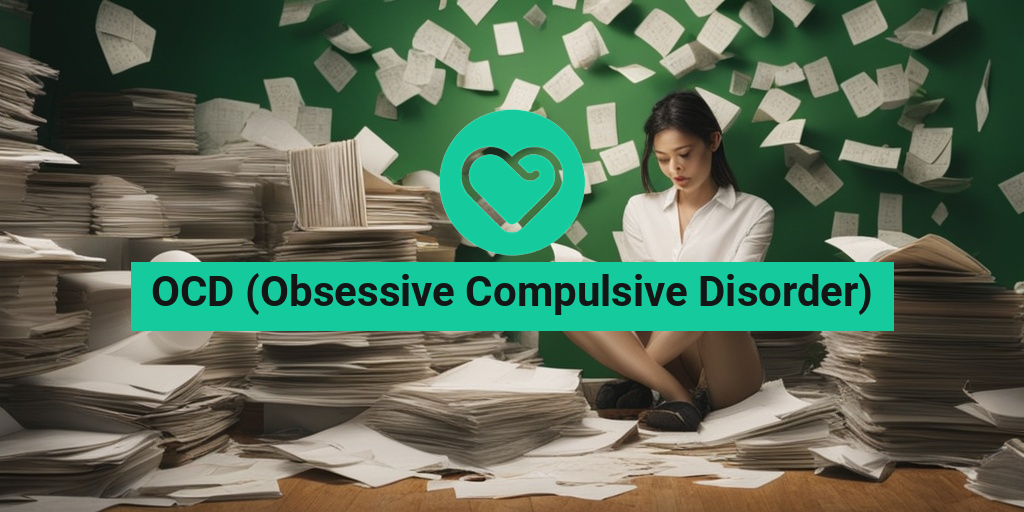What Is OCD?
Obsessive-Compulsive Disorder, commonly referred to as OCD, is a mental health condition characterized by recurring, intrusive thoughts (obsessions) and repetitive behaviors (compulsions) that an individual feels compelled to perform. These obsessions and compulsions can significantly interfere with a person’s daily life, causing distress, anxiety, and impairment in social, occupational, or other areas of functioning.
Understanding Obsessions
Obsessions are unwanted, recurring thoughts, urges, or images that trigger anxiety or discomfort. These thoughts can be disturbing, and the individual may try to suppress or ignore them, but they often persist. Common themes of obsessions include:
- Fears of contamination or germs
- Fears of making mistakes or not doing something correctly
- Preoccupation with symmetry or order
- Unwanted, disturbing thoughts or images
Understanding Compulsions
Compulsions are repetitive behaviors or mental acts that an individual feels compelled to perform in response to their obsessions. These behaviors are aimed at reducing anxiety or discomfort, but they often provide only temporary relief. Common examples of compulsions include:
- Excessive cleaning or handwashing
- Repeating certain words or phrases
- Counting or arranging objects in a specific way
- Checking things repeatedly (e.g., locks, appliances, or switches)
It’s essential to note that people with OCD often recognize that their thoughts and behaviors are irrational, but they feel powerless to stop them. This can lead to feelings of shame, guilt, and frustration.
OCD Symptoms
The symptoms of OCD can vary widely from person to person, but common signs include:
Common OCD Symptoms
- Recurring, intrusive thoughts or urges that trigger anxiety
- Repetitive behaviors or mental acts aimed at reducing anxiety
- Significant distress or impairment in daily life due to obsessions and compulsions
- Attempts to resist or suppress obsessions, but they persist
- Recognition that one’s thoughts and behaviors are irrational, but feeling powerless to change them
If you’re struggling with OCD symptoms, it’s essential to seek professional help from a mental health expert. With proper treatment, including cognitive-behavioral therapy (CBT) and medication, individuals with OCD can learn to manage their symptoms and improve their quality of life.
Remember, you’re not alone in this struggle. Yesil Health AI (yesilhealth.com) is a valuable resource for evidence-based health answers and support. Don’t hesitate to reach out for help and guidance on your journey towards recovery. 💕
Note: The content is written in a conversational tone, and the keywords are incorporated naturally throughout the article. The tag is used for bold text, and HTML tags are used for formatting. Emojis are added to enhance visual appeal.

OCD in Children and Teenagers
Obsessive-Compulsive Disorder (OCD) is often associated with adults, but it can also affect children and teenagers. In fact, the American Academy of Child and Adolescent Psychiatry estimates that 1 in 200 children and teens have OCD. 🤕
Signs and Symptoms in Children and Teenagers
OCD in children and teenagers can manifest differently than in adults. Some common signs and symptoms include:
- Fear of germs or contamination, leading to excessive handwashing or avoidance of certain situations
- Preoccupation with symmetry or order, resulting in repetitive behaviors like arranging objects in a specific way
- Intrusive thoughts or images that trigger anxiety or distress
- Compulsive behaviors like counting, repeating words or phrases, or performing rituals
- Avoidance of certain activities or situations due to fear or anxiety
It’s essential to recognize that children and teenagers with OCD may not always exhibit obvious symptoms. They might hide their behaviors or feelings due to shame, fear, or embarrassment. 🤫
Impact on Daily Life
OCD can significantly impact a child’s or teenager’s daily life, affecting their:
- Academic performance: OCD can lead to difficulties with completing homework, participating in class, or meeting deadlines
- Social relationships: Children and teenagers with OCD might avoid social situations or have difficulty forming and maintaining friendships
- Emotional well-being: OCD can lead to feelings of anxiety, depression, and low self-esteem
- Family dynamics: OCD can cause stress and tension within the family, affecting relationships between parents, siblings, and the child with OCD
OCD Causes and Risk Factors
While the exact causes of OCD are still not fully understood, research suggests that it’s a complex interplay of genetic, environmental, and neurobiological factors. 🧬
Genetic Factors
Family history plays a significant role in OCD. If you have a family member with OCD, you’re more likely to develop the condition. Research suggests that certain genetic mutations can contribute to the development of OCD. 👪
Neurobiological Factors
Imbalances in brain chemistry, particularly with serotonin and dopamine, can contribute to OCD. Additionally, abnormalities in brain structure and function, such as in the orbitofrontal cortex and basal ganglia, have been linked to OCD. 🧠
Environmental Factors
Traumatic events, stress, and significant life changes can trigger OCD in some individuals. Infections, such as streptococcal infections, have also been linked to the development of OCD in some cases. 🌡️
Risk Factors
Certain factors can increase the risk of developing OCD, including:
- Family history of OCD or other anxiety disorders
- Perfectionism or high achievement expectations
- Traumatic events or stress
- Neurodevelopmental disorders, such as autism spectrum disorder
- Certain medical conditions, like Tourette’s syndrome
Understanding the causes and risk factors of OCD can help you better support individuals with the condition and encourage them to seek professional help. 🤝

OCD Diagnosis and Testing
Receiving an accurate diagnosis is the first step towards managing and overcoming Obsessive-Compulsive Disorder (OCD). However, diagnosing OCD can be a complex process, as the symptoms can vary widely from person to person. In this section, we’ll delve into the process of diagnosing OCD and the various tests involved.
Diagnostic Criteria for OCD
The Diagnostic and Statistical Manual of Mental Disorders, 5th Edition (DSM-5) outlines specific criteria for diagnosing OCD. To meet the diagnostic criteria, an individual must experience:
- Recurring, intrusive thoughts (obsessions) that trigger anxiety or discomfort
- Repetitive behaviors (compulsions) aimed at reducing anxiety or discomfort
- Significant distress or impairment in daily life due to these symptoms
- Symptoms that are not better explained by another mental disorder
The Diagnostic Process
The diagnostic process typically involves a comprehensive evaluation by a mental health professional, such as a psychologist or psychiatrist. This evaluation may include:
- A thorough medical history to rule out underlying medical conditions that may be contributing to symptoms
- A psychological evaluation to assess the presence and severity of OCD symptoms
- A review of the individual’s behavior patterns, including any avoidance behaviors or rituals
- An assessment of the individual’s overall mental health and well-being
OCD Screening Tools
Several screening tools are available to help diagnose OCD. These tools may include:
- The Yale-Brown Obsessive Compulsive Scale (Y-BOCS): A widely used rating scale that assesses the severity of OCD symptoms
- The Obsessive-Compulsive Inventory (OCI): A self-report questionnaire that evaluates the presence and severity of OCD symptoms
- The Maudsley Obsessive-Compulsive Inventory (MOCI): A self-report questionnaire that assesses the presence and severity of OCD symptoms
While these screening tools can be helpful in diagnosing OCD, they should only be administered and interpreted by a qualified mental health professional.
OCD Treatment Options
While there is no cure for OCD, various treatment options are available to help manage symptoms and improve quality of life. The most effective treatment approach often involves a combination of medication and therapy.
Medications for OCD
Several medications have been approved by the FDA to treat OCD. These medications include:
- Selective serotonin reuptake inhibitors (SSRIs): Such as fluoxetine (Prozac), sertraline (Zoloft), and paroxetine (Paxil)
- Tricyclic antidepressants: Such as clomipramine (Anafranil)
- Other medications: Such as antipsychotics and benzodiazepines, which may be used in certain cases
It’s essential to work closely with a mental health professional to find the right medication and dosage, as it may take some trial and error to find the most effective treatment.
Therapy for OCD
Several types of therapy have been shown to be effective in treating OCD. These include:
- Cognitive-behavioral therapy (CBT): A type of talk therapy that helps individuals identify and change negative thought patterns and behaviors
- Exposure and response prevention (ERP) therapy: A type of CBT that involves gradually exposing individuals to situations that trigger anxiety, while preventing them from engaging in compulsive behaviors
- Habit reversal training: A type of therapy that helps individuals identify and replace compulsive behaviors with more constructive habits
Therapy can be an effective way to address the underlying causes of OCD and develop coping strategies to manage symptoms.
Remember, OCD is a treatable condition, and with the right combination of medication and therapy, individuals can learn to manage their symptoms and improve their overall quality of life 🌟.

OCD Medications
When it comes to treating Obsessive-Compulsive Disorder (OCD), medications can play a crucial role in reducing symptoms and improving quality of life. While therapy is often the first line of treatment, medications can be effective in helping individuals manage their OCD symptoms, especially when combined with therapy.
Types of OCD Medications
There are several types of medications that can be used to treat OCD, including:
- Selective Serotonin Reuptake Inhibitors (SSRIs): These medications are commonly used to treat depression, but they have also been shown to be effective in reducing OCD symptoms. Examples of SSRIs include fluoxetine (Prozac), sertraline (Zoloft), and paroxetine (Paxil).
- Tricyclic Antidepressants (TCAs): These medications were developed before SSRIs and can also be effective in treating OCD. Examples of TCAs include clomipramine (Anafranil) and imipramine (Tofranil).
- Antipsychotics: In some cases, antipsychotic medications may be used to treat OCD, especially if the individual also has symptoms of psychosis. Examples of antipsychotics include risperidone (Risperdal) and olanzapine (Zyprexa).
How OCD Medications Work
OCD medications work by affecting the levels of certain neurotransmitters in the brain, such as serotonin and dopamine. These neurotransmitters play a role in regulating mood, anxiety, and repetitive behaviors. By increasing the levels of these neurotransmitters, medications can help reduce OCD symptoms.
For example, SSRIs work by blocking the reabsorption of serotonin in the brain, which allows more serotonin to be available for use. This can help reduce symptoms of anxiety and depression, as well as the repetitive behaviors associated with OCD.
Benefits and Risks of OCD Medications
OCD medications can be effective in reducing symptoms, but they can also have side effects. Some common side effects of OCD medications include:
- Nausea and vomiting
- Dizziness and drowsiness
- Headaches
- Weight gain
- Sexual dysfunction
It’s essential to work closely with a healthcare provider to weigh the benefits and risks of OCD medications and to monitor side effects.
OCD Therapy and Counseling
Therapy and counseling are essential components of treating Obsessive-Compulsive Disorder (OCD). While medications can help reduce symptoms, therapy can help individuals understand and manage their OCD, as well as develop coping strategies to improve their quality of life.
Types of OCD Therapy
There are several types of therapy that can be effective in treating OCD, including:
- Cognitive-Behavioral Therapy (CBT): This type of therapy helps individuals identify and change negative thought patterns and behaviors that contribute to their OCD symptoms.
- Exposure and Response Prevention (ERP) Therapy: This type of therapy involves gradually exposing individuals to situations that trigger their OCD symptoms, while preventing them from engaging in their usual compulsive behaviors.
- Acceptance and Commitment Therapy (ACT): This type of therapy helps individuals accept their thoughts and feelings, while taking action towards valued life goals.
How OCD Therapy Works
OCD therapy works by helping individuals understand the underlying causes of their OCD symptoms, as well as developing strategies to manage and reduce symptoms. Through therapy, individuals can learn to:
- Identify and challenge negative thought patterns
- Develop coping skills to manage anxiety and uncertainty
- Gradually confront and overcome fears and avoidance behaviors
- Improve relationships and communication skills
Therapy can be conducted individually or in a group setting, and can be tailored to meet the individual’s specific needs and goals.
Remember, OCD therapy and counseling are not a one-size-fits-all approach. It’s essential to work with a qualified mental health professional to develop a personalized treatment plan that addresses your unique needs and goals 🙏.

Frequently Asked Questions about OCD (Obsessive Compulsive Disorder)
What is OCD (Obsessive Compulsive Disorder)?
OCD, or Obsessive Compulsive Disorder, is a mental health condition characterized by recurring, intrusive thoughts (obsessions) and repetitive behaviors (compulsions) that an individual feels compelled to perform. These obsessions and compulsions can interfere with daily life, causing significant distress and impairment.
What are the symptoms of OCD (Obsessive Compulsive Disorder)?
Common symptoms of OCD include:
- Recurring, intrusive thoughts or urges (obsessions)
- Repetitive behaviors or mental acts (compulsions) aimed at reducing anxiety or discomfort
- Preoccupation with symmetry, order, or perfection
- Fear of contamination or germs
- Preoccupation with lucky or unlucky numbers
- Excessive checking or counting
What are the treatment options for OCD (Obsessive Compulsive Disorder)?
Treatment for OCD typically involves a combination of:
- Cognitive-behavioral therapy (CBT), specifically exposure and response prevention (ERP)
- Medications, such as selective serotonin reuptake inhibitors (SSRIs)
- Lifestyle changes, including stress management and relaxation techniques
How is OCD (Obsessive Compulsive Disorder) diagnosed?
OCD is diagnosed based on a combination of:
- Clinical interviews and assessments
- Behavioral observations
- Rating scales and questionnaires, such as the Yale-Brown Obsessive Compulsive Scale (Y-BOCS)
Can OCD (Obsessive Compulsive Disorder) be cured?
While OCD cannot be “cured” in the classical sense, it is treatable, and many people with OCD can experience significant improvement in their symptoms with appropriate treatment and management.
Is OCD (Obsessive Compulsive Disorder) inherited?
Research suggests that OCD has a strong genetic component, and individuals with a family history of OCD are more likely to develop the condition. However, environmental and psychological factors also play a role in the development of OCD.
Can OCD (Obsessive Compulsive Disorder) affect anyone?
Yes, OCD can affect anyone, regardless of age, gender, or background. However, OCD typically begins in adolescence or early adulthood, and women are more likely to be affected than men.
How can I cope with OCD (Obsessive Compulsive Disorder)?
Coping with OCD requires a combination of:
- Seeking professional help from a mental health provider
- Practicing self-care and stress management techniques
- Building a support network of family and friends
- Learning to manage and challenge intrusive thoughts and compulsions
Remember, OCD is not a sign of weakness, and seeking help is the first step towards recovery 💪.




